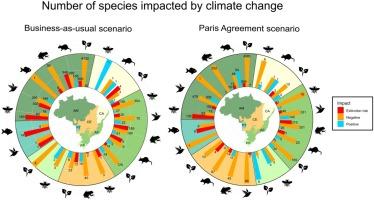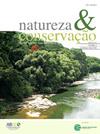巴西的气候变化和生物多样性:我们知道什么,我们不知道什么,以及《巴黎协定》降低风险的潜力
IF 3.5
2区 环境科学与生态学
Q1 BIODIVERSITY CONSERVATION
引用次数: 0
摘要
近几十年来,巴西积累了大量关于气候变化对其生物多样性潜在影响的知识。研究预测的影响大多是负面的,也有一些是积极的,是时候综合这些信息了。我们对文献进行了系统回顾和定量分析,从131篇论文中收集了20,582个风险预测。然后我们估计了预测风险的效应大小。研究发现,气候变化对生物多样性的影响存在空间差异。潘塔纳尔湿地预计将遭受最严重的负面影响,其次是亚马逊和大西洋森林,而潘帕草原预计会受到较小的影响。我们的分析也揭示了偏见和知识差距。例如,由于缺乏对海洋环境的研究,无法将其纳入分析,而且对亚马逊和大西洋森林有强烈的偏见,缺乏对潘塔纳尔河和潘帕草原的研究。此外,对植物和陆生脊椎动物的分类倾向占数据的90%。最后,虽然遵守《巴黎协定》不太可能消除气候变化对生物多样性的影响,但我们的分析预测,它可以将这些影响减少20%,并将巴西因气候变化而面临灭绝风险的物种数量减少一半。本文章由计算机程序翻译,如有差异,请以英文原文为准。

Climate change and biodiversity in Brazil: What we know, what we don’t, and Paris Agreement’s risk reduction potential
Over recent decades, Brazil has amassed a wealth of knowledge regarding the potential effects of climate change on its biodiversity. Studies have predicted mostly negative impacts and some positive ones, and it is time to synthesize this information. We did a systematic review of the literature and quantitative analysis, gathering 20,582 risk projections from 131 papers. We then estimated the effect size of the projected risks. We found that climate change impacts on biodiversity vary spatially. The Pantanal wetlands are predicted to experience the most significant negative impacts, followed by the Amazon and the Atlantic Forest, while the Pampa grasslands are expected to see lower impacts. Our analysis also reveals biases and knowledge gaps. For example, the shortage of studies on marine environments precluded their inclusion in the analysis, and there was a strong bias towards the Amazon and the Atlantic Forest, with a shortage of studies on the Pantanal and the Pampa. Moreover, there was a taxonomic bias towards plants and terrestrial vertebrates, which comprised >90% of the data. Finally, while adherence to the Paris Agreement is unlikely to eliminate climate change impacts on biodiversity, our analysis predicts that it could reduce these impacts by 20% and halve the number of species at risk of extinction from climate change in Brazil.
求助全文
通过发布文献求助,成功后即可免费获取论文全文。
去求助
来源期刊

Perspectives in Ecology and Conservation
Environmental Science-Nature and Landscape Conservation
CiteScore
7.80
自引率
4.30%
发文量
46
审稿时长
59 days
期刊介绍:
Perspectives in Ecology and Conservation (PECON) is a scientific journal devoted to improving theoretical and conceptual aspects of conservation science. It has the main purpose of communicating new research and advances to different actors of society, including researchers, conservationists, practitioners, and policymakers. Perspectives in Ecology and Conservation publishes original papers on biodiversity conservation and restoration, on the main drivers affecting native ecosystems, and on nature’s benefits to people and human wellbeing. This scope includes studies on biodiversity patterns, the effects of habitat loss, fragmentation, biological invasion and climate change on biodiversity, conservation genetics, spatial conservation planning, ecosystem management, ecosystem services, sustainability and resilience of socio-ecological systems, conservation policy, among others.
 求助内容:
求助内容: 应助结果提醒方式:
应助结果提醒方式:


